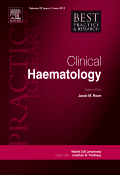
BEST PRACTICE & RESEARCH CLINICAL HAEMATOLOGY
Scope & Guideline
Pioneering Knowledge in Clinical Hematology
Introduction
Aims and Scopes
- Hematopoietic Cell Transplantation (HCT):
The journal consistently emphasizes research related to hematopoietic cell transplantation, including donor-recipient matching, graft-versus-host disease (GVHD), and the use of cellular therapies such as CAR T-cell therapy. - Immunotherapy in Hematology:
A core area of focus is the exploration of immunotherapeutic strategies, including immune checkpoint inhibitors and CAR T-cell therapies, for the treatment of various hematological malignancies. - Genomics and Cytogenetics:
The journal publishes numerous studies on the role of genomic and cytogenetic alterations in hematological diseases, providing insights into diagnosis, prognosis, and treatment personalization. - Real-world Evidence and Registries:
A significant focus is placed on the importance of registries and real-world data in understanding treatment outcomes and improving clinical practices in hematology. - Clinical Guidelines and Best Practices:
The journal aims to establish and disseminate best practices and clinical guidelines based on the latest research to enhance patient care and treatment efficacy in hematology.
Trending and Emerging
- Novel Immunotherapeutic Strategies:
Recent publications highlight a surge in interest regarding novel immunotherapeutic approaches, including off-the-shelf CAR T-cell therapies and immune checkpoint inhibitors, emphasizing their potential to revolutionize treatment paradigms. - Microbiome and Host Interaction:
Emerging research is exploring the role of the intestinal microbiome and its metabolites in influencing outcomes in hematopoietic cell transplantation and the pathogenesis of graft-versus-host disease, indicating a growing recognition of the microbiome's impact on hematology. - Real-World Evidence and Data Utilization:
There is an increasing emphasis on the use of real-world evidence and observational data from registries to inform clinical practices and improve patient outcomes in hematology, reflecting a trend towards data-driven decision-making. - Genomic Insights and Precision Medicine:
Publications focusing on the genomic characterization of hematological malignancies are on the rise, underscoring the importance of precision medicine and personalized treatment approaches based on genetic profiling.
Declining or Waning
- Traditional Chemotherapy Approaches:
There is a noticeable decline in publications focusing on traditional chemotherapy regimens for hematological malignancies, as the field increasingly shifts towards targeted therapies and immunotherapies. - Pediatric Hematology Studies:
While pediatric hematology remains important, the frequency of publications specifically addressing pediatric hematological disorders has decreased as more research is directed towards adult populations and novel treatment modalities. - Vascular Complications in Hematology:
Research related to vascular complications, such as thrombosis and anticoagulation strategies, has waned, indicating a potential shift in focus towards more innovative treatment strategies and precision medicine.
Similar Journals
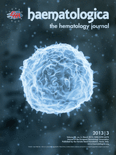
HAEMATOLOGICA
Connecting Scholars: Shaping the Future of HematologyHAEMATOLOGICA, published by FERRATA STORTI FOUNDATION, is a prestigious journal in the field of hematology, recognized for its high impact and contribution to advancing research in this critical area of medicine. With an impressive Q1 ranking in the 2023 category of Hematology and a notable Scopus rank of #12 out of 137, the journal serves as an essential platform for disseminating innovative studies, clinical trials, and comprehensive reviews from 1947 to 2024. Based in Italy, with a commitment to quality and academic integrity, HAEMATOLOGICA fosters collaboration among researchers, practitioners, and students interested in the latest developments and methodologies within hematological science. Although it does not offer open access, the journal ensures that valuable insights are accessible through institutional subscriptions, emphasizing its role in shaping the future of hematologic research.
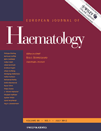
EUROPEAN JOURNAL OF HAEMATOLOGY
Innovative Insights into Blood Health and DiseaseEUROPEAN JOURNAL OF HAEMATOLOGY, published by Wiley, serves as a vital resource for experts in the field of hematology, focusing on the latest advancements in blood disorders and therapies. With an ISSN of 0902-4441 and an E-ISSN of 1600-0609, this esteemed journal has been disseminating knowledge since 1986 and continues to thrive, converging its visionary approach through to 2024. Notably, it holds a distinguished Q2 ranking in Hematology and an impressive Q1 ranking in the broader category of Medicine (miscellaneous) as of 2023, highlighting its significant contribution to the scientific community. With a Scopus rank of #45/137 and a 67th percentile in the field, the journal is recognized for its rigorous peer-reviewed research, making it an indispensable publication for researchers, practitioners, and students aiming to stay at the forefront of hematological studies. Though not an open-access journal, it ensures broad accessibility to critical findings via its subscription model, thus fostering an informed and globally engaged audience.
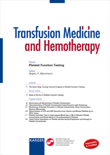
TRANSFUSION MEDICINE AND HEMOTHERAPY
Exploring breakthroughs in hemotherapy and patient care.TRANSFUSION MEDICINE AND HEMOTHERAPY, published by KARGER, is a prominent journal dedicated to advancing the fields of hematology and transfusion medicine. With an ISSN of 1660-3796 and E-ISSN 1660-3818, this esteemed journal has been a valuable resource for researchers and clinicians since its inception in 1973, with significant publication phases continuing into 2024. It currently holds a Q2 ranking in Hematology and a Q3 ranking in Immunology and Allergy, reflecting its impact and relevance in these critical fields. The journal features original articles, reviews, and clinical studies, presenting cutting-edge research that aids in the development of effective therapies and enhances patient care. Open access options are available, ensuring that crucial findings are accessible to a broad audience. As an important platform for dialogue and advancement in transfusion science, TRANSFUSION MEDICINE AND HEMOTHERAPY supports the global health community's efforts to improve treatment outcomes and foster innovation in medical practices.
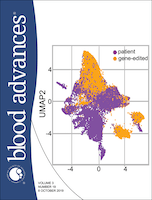
Blood Advances
Pioneering Discoveries in Blood DisordersBlood Advances is a premier, peer-reviewed journal published by Elsevier, dedicated to the field of hematology. With an impressive impact factor and classified within the Q1 category of hematology for 2023, it ranks as the 16th out of 137 journals in the Scopus Medicine Hematology category, placing it in the top 88th percentile globally. This influential journal, which has been disseminating invaluable research since its inception in 2017, focuses on advancing knowledge and innovation in blood science, including clinical and laboratory aspects of hematology. Although it offers limited open access features, its comprehensive scope encompasses various topics relevant to both researchers and practitioners. Located in the United States and managed from Amsterdam, Blood Advances provides a vital platform for the dissemination of groundbreaking research, making significant contributions to the understanding and treatment of blood disorders. Researchers, professionals, and students alike will find this journal an essential resource for keeping abreast of the latest developments and advancements in hematology.
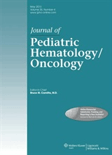
JOURNAL OF PEDIATRIC HEMATOLOGY ONCOLOGY
Bridging research and practice in pediatric hematology and oncology.JOURNAL OF PEDIATRIC HEMATOLOGY ONCOLOGY, published by Lippincott Williams & Wilkins, serves as a vital platform for the dissemination of cutting-edge research and insights in the fields of pediatric hematology and oncology. Since its inception in 1979, the journal has maintained a commitment to advancing knowledge through peer-reviewed articles that contribute to the understanding and treatment of blood disorders and cancers in children. With an impact factor reflective of its academic contributions, the journal is positioned in the Q3 quartile across key medical categories — Hematology, Oncology, and Pediatrics, Perinatology and Child Health — indicating its relevance and influence in the field. While it does not currently offer open access options, the journal remains a crucial resource for researchers, clinicians, and students dedicated to improving pediatric care and outcomes. Researchers are encouraged to contribute to this esteemed journal as it seeks to bridge the gap between clinical practice and research, fostering innovation and improved quality of life for young patients affected by hematologic and oncologic conditions.

EXPERIMENTAL HEMATOLOGY
Unraveling Complexities in Hematology for Better Patient OutcomesEXPERIMENTAL HEMATOLOGY, published by Elsevier Science Inc, is a leading journal in the field of hematology, distinguished by its impactful contributions to the study of blood-related disorders and cellular biology. With an ISSN of 0301-472X and an E-ISSN of 1873-2399, this journal has established a significant presence since its inception in 1973, continuing to be relevant through 2024. It holds a commendable Q1 ranking in Hematology and Q2 in various significant categories including Cancer Research, Cell Biology, Genetics, and Molecular Biology, recognizing its quality and influence in the scientific community. Researchers and professionals can access a wide range of meticulously peer-reviewed articles that promote cutting-edge research and foster collaboration across disciplines. As a vital platform for disseminating innovative findings, EXPERIMENTAL HEMATOLOGY empowers its audience to delve deeper into the complexities of hematological research and brings to light the advances critical for improving patient outcomes.
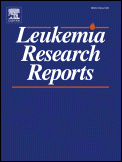
Leukemia Research Reports
Advancing knowledge in leukemia research.Leukemia Research Reports, published by Elsevier Advanced Technology, is a prominent open-access journal dedicated to the latest advancements in the field of hematology and oncology. Since its launch in 2012, this journal has been a vital resource for researchers, healthcare professionals, and students aiming to disseminate and access high-quality research articles focused on various aspects of leukemia and related blood disorders. With an impact factor indicative of its significance in the field, Leukemia Research Reports currently holds a Q3 quartile ranking in both Hematology and Oncology, and is included in key databases such as Scopus. The journal not only embraces a commitment to open access, ensuring that research is freely available, but also actively promotes collaborations that strive to enhance our understanding and treatment of leukemia. Based in the United Kingdom, this journal continues to play a crucial role in fostering innovation and knowledge sharing within the medical community.

Experimental Hematology & Oncology
Empowering Discovery in Hematology and OncologyExperimental Hematology & Oncology is a premier journal published by BMC, dedicated to advancing knowledge in the fields of hematology, oncology, and cancer research. Since its inception in 2012, this Open Access journal has emerged as a vital resource for researchers and healthcare professionals, fostering the dissemination of high-quality research that enhances our understanding of blood disorders and malignancies. With impressive rankings in Quarters 1 of key categories including Cancer Research, Hematology, and Oncology, it holds significant prestige, evidenced by its Scopus rankings: #42/404 in Medicine (Oncology) and #17/137 in Medicine (Hematology). The journal aims to publish cutting-edge studies, reviews, and perspectives that contribute to the evolution of therapeutic strategies and innovative treatment modalities. Researchers and practitioners alike will find this journal indispensable for staying at the forefront of breakthroughs in hematological and oncological research.

Memo-Magazine of European Medical Oncology
Elevating Oncology Research to New HeightsMemo-Magazine of European Medical Oncology is a premier academic journal dedicated to advancing the fields of oncology and hematology. Published by SPRINGER WIEN, this journal offers a vital platform for researchers, clinicians, and students to disseminate and access cutting-edge findings within the realm of medical oncology. With an ISSN of 1865-5041 and an E-ISSN of 1865-5076, it has made a significant impact, evidenced by its ranking in the third quartile (Q3) across both hematology and oncology categories. Converging years from 2008 to 2024, Memo-Magazine plays a crucial role in fostering collaboration and knowledge exchange among professionals in these critical areas of health care, despite its current classification within the 31st and 30th percentiles of Scopus rankings in oncology and hematology, respectively. Researchers are encouraged to engage with the journal to enhance their understanding of the evolving challenges and solutions in medical oncology.
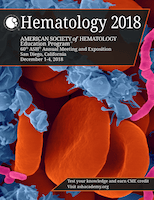
Hematology-American Society of Hematology Education Program
Navigating the Future of Hematology TogetherHematology-American Society of Hematology Education Program is a premier peer-reviewed journal dedicated to advancing the field of hematology through comprehensive educational content. Published by the American Society of Hematology, this journal plays a crucial role in disseminating knowledge to researchers, clinicians, and students in hematology and related disciplines. With an impressive Q1 status in the field, it ranks among the top journals at the forefront of hematological research, as evidenced by its 60th percentile ranking in Scopus' Medicine - Hematology category. Although it does not offer open access, the journal provides invaluable insights and educational resources from leading experts, focusing on the latest advancements, treatment protocols, and evolving understanding of blood disorders. Covering a wide range of topics, from basic research to clinical applications, this journal is essential for anyone seeking to deepen their expertise and stay informed on the latest developments in hematology. For further engagement, readers can access insightful articles published since 2001, ensuring a rich repository of knowledge for ongoing research and clinical excellence.